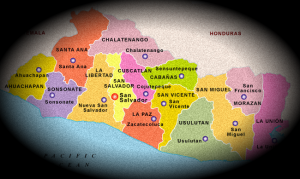CHWs Around the World (Part II): El Salvador’s Promotores

Countries around the globe are working together to strengthen health systems: last week we celebrated the 500-day milestone until the target date to reach the Millennium Development Goals (MDGs). As the development community transitions to a new framework, the Sustainable Development Goals (SDGs), we at the One Million Community Health Worker (1mCHW) Campaign wish to highlight some community health worker (CHW) programs that have been particularly successful since the MDGs inception in 2000. Hopefully some of the characteristics from these programs can be incorporated into the design of the SDGs, as we all make the push for universal health coverage (UHC).
Although the 1mCHW Campaign focuses solely on sub-Saharan Africa, there are a number of wonderful CHW programs from other parts of the world that have much to offer the development community in terms of best practices. You can read the first segment of our series, on Iran’s behvarz, here. This week, we bring you an inside look at El Salvador’s promotores, or health promoters.
———
El Salvador, the smallest and most populated country in Central America, calls their CHWs promotores, or health promoters. This name brings to mind advocacy and more general health promotion, and indeed that does describe the majority of the promoter’s activities. El Salvador’s promoters are trained on a wide number of basic services, both preventative and treatment-oriented, but their focus remains on prevention. CHWs often organize large immunization campaigns, have personal talks with families about sanitation and hygiene, and speak with mothers about the respiratory dangers of indoor cookfires.
So who are these promotores? About two-thirds of El Salvador’s CHWs are women, and on average have only four years of primary education. However, they receive a strong twelve-week accreditation training, along with frequent refresher courses along the way: CHWs attend one day of training per month, which surveys have shown to be the single biggest productivity booster and incentive for the workers. Promoters are expected to visit “low risk” households once per month and “high risk” households (those with demonstrated need or a history of illness) twice per month, leading to an average of 8-12 household visits daily.
The promoters are well integrated into El Salvador’s primary health care framework. They frequently refer patients to higher-level facilities: there are 396 health facilities throughout the country run by the Ministerio de Salud Pública y Asistencia Social (MSPAS, or the Ministry of Health). These range from outpatient health posts and units to inpatient health centers and hospitals.
The government of El Salvador isn’t the only community health provider in the country. While MSPAS currently has about 1,438 promoters, other non-governmental organizations throughout El Salvador employ about 2,498 workers. Both sectors pay their CHWs, although the government is known to better compensate their promoters, a trend which the Campaign supports. However, NGO promotores receive more training and supervision than governmental ones, and are given more supplies and medication. A study found that of the only 10% of Salvadorians seek CHWs when ill, and they consult NGO and MSPAS promoters at a rate of 7% and 3% respectively. NGO promoters are perceived to be better equipped and provide better value; communities are often critical of governmental CHWs due to their lack of medication and equipment.
There has been little research on the efficacy of CHWs in El Salvador, but the program design that the country has implemented is novel and has a number of elements that could be successfully replicated in other settings. El Salvador effectively integrates their promotores into their wider primary care network through a strong system of referrals. Additionally, promoters receive continuous refresher trainings, which keep them up to date. Finally, El Salvador’s CHWs promote health knowledge and awareness, which has led to a proven increase in the awareness of health service availability.
In 2009, the Salvadorian government created a list of goals for human resources for health (HRH), showing their dedication to the importance of HRH in achieving UHC even before the global health community committed to HRH at GHWA. On that list they pledged themselves to increase the capacity of community health workers across the country; we commend El Salvador in their commitment to HRH and CHWs, and encourage others across the globe to follow their example as we head into the post-MDG era.
